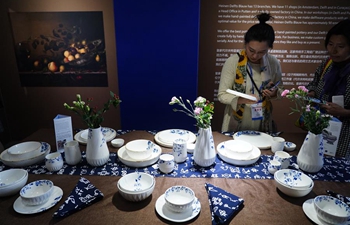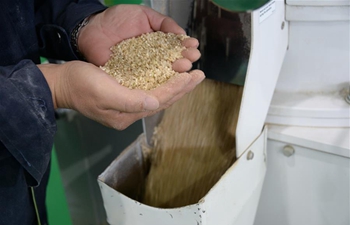NAIROBI, Oct. 18 (Xinhua) -- Millicent Kagonga, 30, has been through difficulty in her life since contracting cervical cancer.
Kagonga was diagnosed with cervical cancer five years back and somehow lost hope in life due to the pain and stigma.
"I suffered from pain and cultural beliefs that associated my illness to bad omen in the community," Kagonga told Xinhua in an interview on Friday.
Kagonga said that she picked courage and went to test her condition at Kenyatta National Hospital (KNH) where she was found to have cervical cancer.
Kagonga often bled at home for fear of going to the hospital but once she made up her mind, she underwent chemotherapy at the hospital and today she is walking free from cervical cancer.
"The tests were carried out and I was found to have cervical cancer. I was put on treatment including chemotherapy seasons," she said.
Kagonga today blamed late visit to health facility for screening for the upsurge of cases and deaths in the country.
In 2018, 5,250 cervical cancer cases were reported in Kenya, 63 percent of which resulted in death, according to statistics from the ministry of health.
The disease kills nine women every year and is the third leading cause of death after infectious and cardiovascular diseases.
But with concerted efforts, such unnecessary deaths are likely to be a thing of the past following an official launch of cervical cancer vaccination today.
Collins Tabu, head, National Vaccines and Immunization Program noted that the Human Papillomavirus (HPV) vaccine will be offered free to all 10 years old girls through routine immunization services.
"The vaccine that will complement the existing interventions has the potential of reducing infections by 70 percent," Tabu said.
Tabu said that vaccination is an important event in Kenya's health calendar as it will help save the lives of many women who die from cervical cancer on a daily basis.
This vaccination launch follows pilot demonstrations that were done in 2012-2014 in eastern Kenya where 22,500 girls were vaccinated in 2013-2015 and the government recorded 95 percent success without any side effects.
Sicily Kariuki, cabinet secretary for health said that with support from GAVI Alliance, a global health partnership of public and private sector organizations, the government is spending shillings 800 million (8 million U.S. dollars) in supporting vaccination this year.
She revealed that the vaccination will be offered nationally alongside other routine infant vaccines through an existing network of over 9,000 public and private health facilities.
"The vaccination will be conducted free of charge to 800,000 girls, who are currently 10 years old and subsequently to all girls as they turn 10 years old in future," Kariuki added.
Cancer of the cervix, which forms the lower part of the uterus, is the leading cause of cancer related deaths among women in Kenya.
According to the ministry of health, nine women die from cervical cancer in Kenya alone, every day, a figure that is expected to reduce drastically in the near future.
Despite the achievements that are associated with the official launch of the vaccination, Kenya is late in rolling out this vaccination considering that it is the last country to launch it after other East African countries -- Uganda, Tanzania and Rwanda.
According to Fiona Atuhebwe, new vaccines officer at the World Health Organizations (WHO) African regional office, cancer is a 100 percent treatable disease that is easily managed with early screening and treatment.
Atuhebwe revealed that the vaccine is safe and highly effective in cervical cancer management adding that many countries have used it successfully.
"The cervical cancer vaccine is licensed for use in the country and is currently in use in routine immunization programs of more than 115 countries globally," she added.
For maximum protection, all girls aged 10 years in Kenya will receive two doses of the vaccine, six months apart.
The girls will also be issued with vaccination cards to help monitor and also generate data of the number of girls who have been attended to.
According Kariuki, the vaccination will be implemented within the framework of achieving Universal Health Coverage (UHC), as part of the preventive and promotive healthcare component.
Following this upsurge of the number of cases, the government has also rolled out a process of establishing regional cancer centers to help manage cases at the grassroots level.
Globally, cancer remains a major public health concern since 18.1 million people were diagnosed with 9.6 million deaths in 2018.
The leading cancers in incidence are lung, breast, prostate and colorectal cancer (6.1 percent), while lung, colorectal, stomach and liver cancer lead in cancer-related deaths. The leading cancers in incidence in Kenya are breast, cervical and esophageal.
"I do not want to see my 10 years old daughter go through what I went through in life having been scared by cultural beliefs," Kagonga notes.













